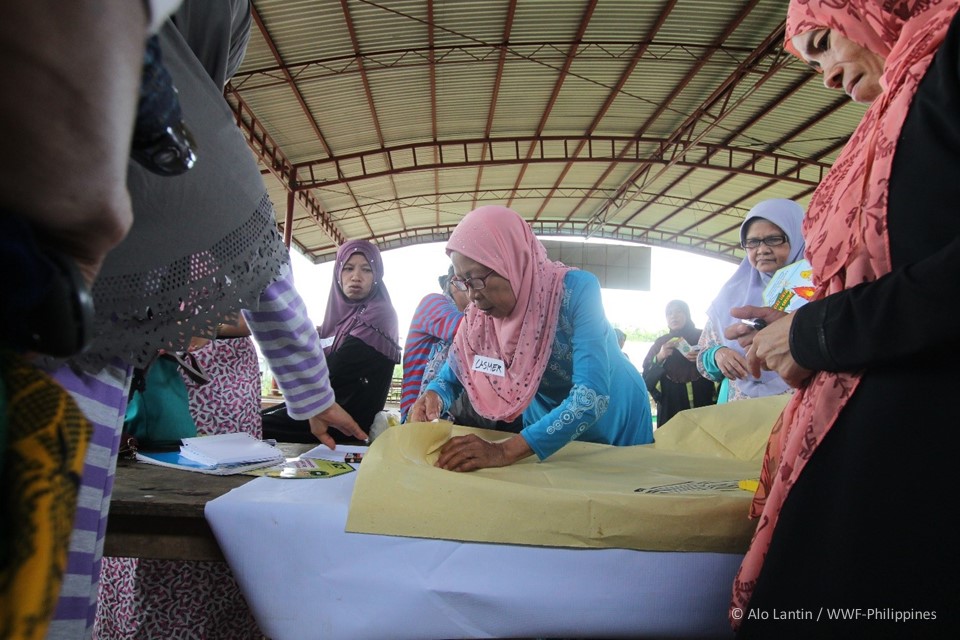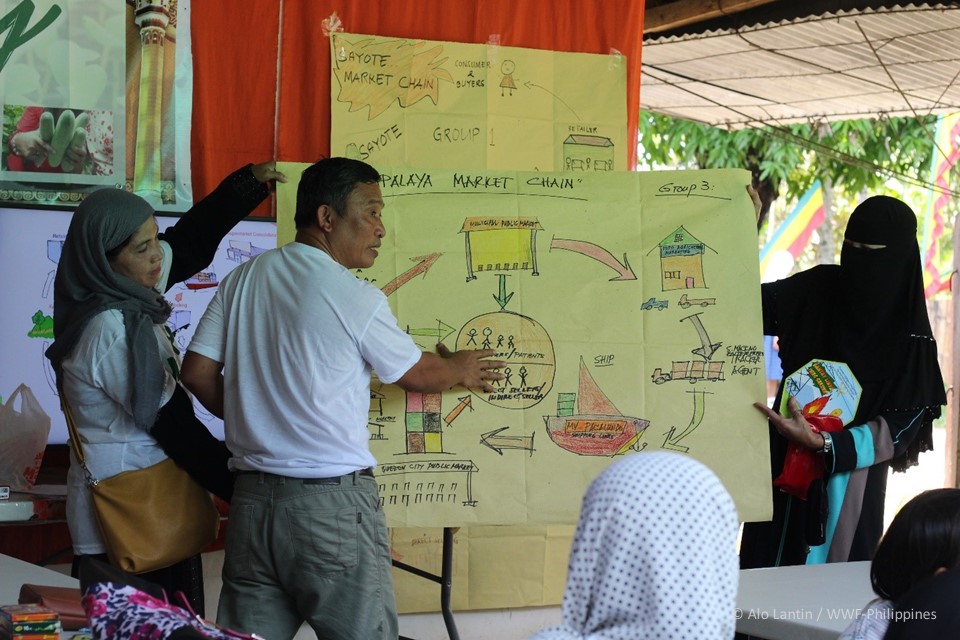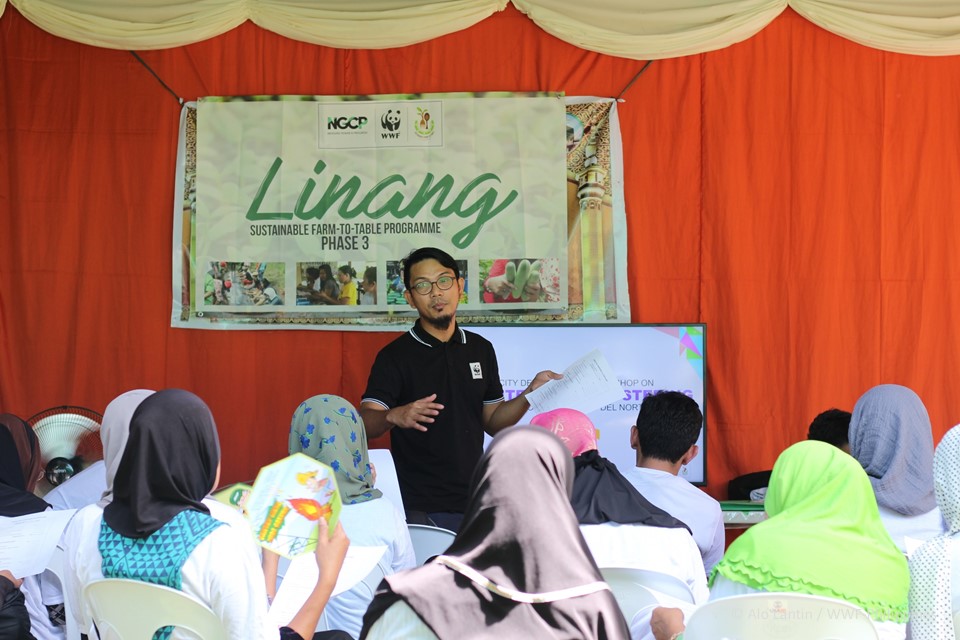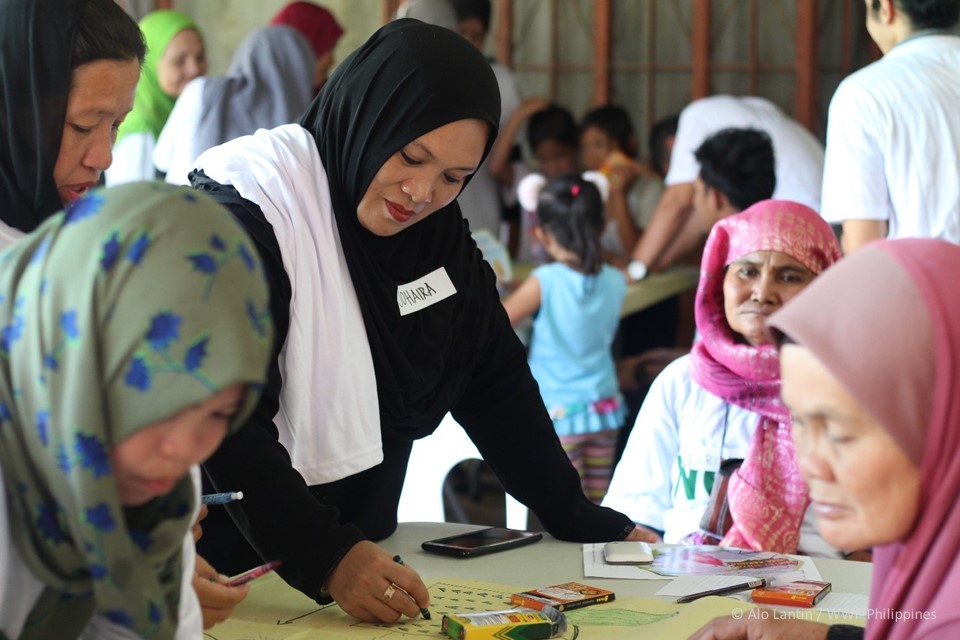Livelihood for All: Doing Development in Muslim Mindanao
June 2019

An Islamic woman brainstorms with her fellow savings group members. In the Lanao del Norte municipality of Baloi, many women are jobless and lack a means of securing food and livelihood security. Photograph © Alo Lantin / WWF-Philippines
In rural Mindanao, a secure livelihood can be hard to pull together – but a Muslim community has found a way to get by.
In Lanao del Norte, just north of Marawi City, the town of Baloi can be found nestled amidst rolling hills and flat plains. While the land is fertile, there isn’t enough of it to grow a sizable, profitable farm. The nearest source of consistent employment is Iligan City, almost an hour north, and many have no choice but to undertake blue collar work such as construction and tricycle driving.
“Many of the women here are jobless. Few of us farm, here in Baloi – not vegetables, not crops, nothing,” says Zenaida Quezon, resident of Baloi. For communities like Baloi, livelihood can be hard to come by, and many are forced to live in a state of poverty. Rice, a staple part of local diets, is sold to them in massive 25 kilogram sacks sold at 1,100 pesos. Households had no choice but to buy these sacks, and each one was a heavy blow to already meager earnings.
Into this context comes WWF-Philippines.

Baloi residents discuss the market chain for ampalaya, one of the crops they hope to create an agricultural business out of. Photograph © Alo Lantin / WWF-Philippines
The World Wide Fund for Nature (WWF) Philippines’ Sustainable Farm to Table program, together with the National Grid Corporation of the Philippines (NGCP), is working to bring food security to rural communities across the country by introducing them to agricultural business. Part of the project is financial literacy and the establishment of Group Savings and Loan Associations (GSLAs), or savings groups, to build a sense of camaraderie as communities learn to plan their enterprises and save money together. But for a town like Baloi that’s largely Muslim, such an arrangement can’t be done.
“Under Islam, you aren’t allowed to make money from money,” said Quezon, herself the Chairwoman of the Baloi GSLA. Under Sharia Law, integral to the Islam faith, it is impermissible to earn money off of an investment, which is one of the concepts upon which the savings groups are built upon. Traditional financial literacy projects aren’t fit for Sharia law – but Baloi, together with WWF-Philippines, found a way around this problem.

Monci Hinay, WWF-Philippines Sustainable Food Systems Project Manager, conducts a financial literacy workshop with the people of Baloi. The savings groups established by Hinay and his team can be tweaked to fit different cultures and religions as an example of inclusive development. Photograph © Alo Lantin
“The people of Baloi recognized for themselves that what they need is rice,” said Monci Hinay, WWF-Philippines Sustainable Food Systems Project Manager. Instead of collecting in a pool of funds, the money raised by the Baloi savings group is used to buy the same 25 kilogram sacks of rice that previously caused grief to the community. The product of their mutual investment, these sacks are then divided amongst the members of the savings group, assuring them enough rice at a price that they can afford.
“That’s the beauty of the GSLA,” said Hinay. “It allows them to think freely, to innovate, and to empower themselves.” Freed from the need to worry whether there will be rice with the next meal, says Hinay, the people of Baloi are able to focus their attentions toward the betterment of their lives and the lives of their neighbors.

Baloi women plan out possible business ventures together. The Sustainable Farm to Table project empowers communities to take their futures into their own hands. Photograph © Alo Lantin / WWF-Philippines
“I want every one of us in this community to find their own livelihood. I want them to be able to take care of their families. That’s all. And we’ll do whatever it takes to help our community,” concluded Quezon.
The GSLAs established by Hinay and his team are an avenue for communities to take their development into their own hands, no matter their culture or their religion. Through food and livelihood security, the Sustainable Farm to Table program is helping communities dream once more.
For more information, please contact:
Monci Hinay
Sustainable Food Systems Project Manager
mhinay@wwf.org.ph
For media arrangements, please contact:
Dan Ramirez
Communications & Media Manager
dramirez@wwf.org.ph
